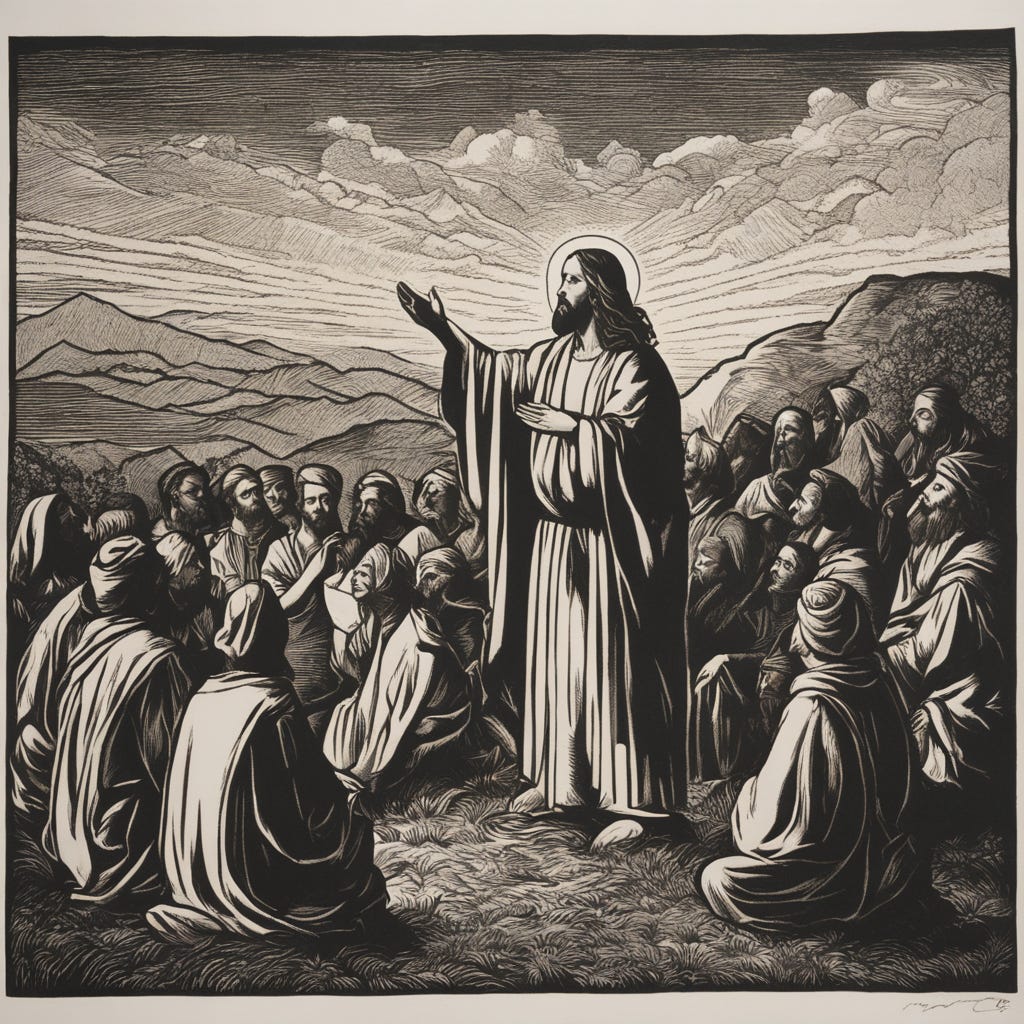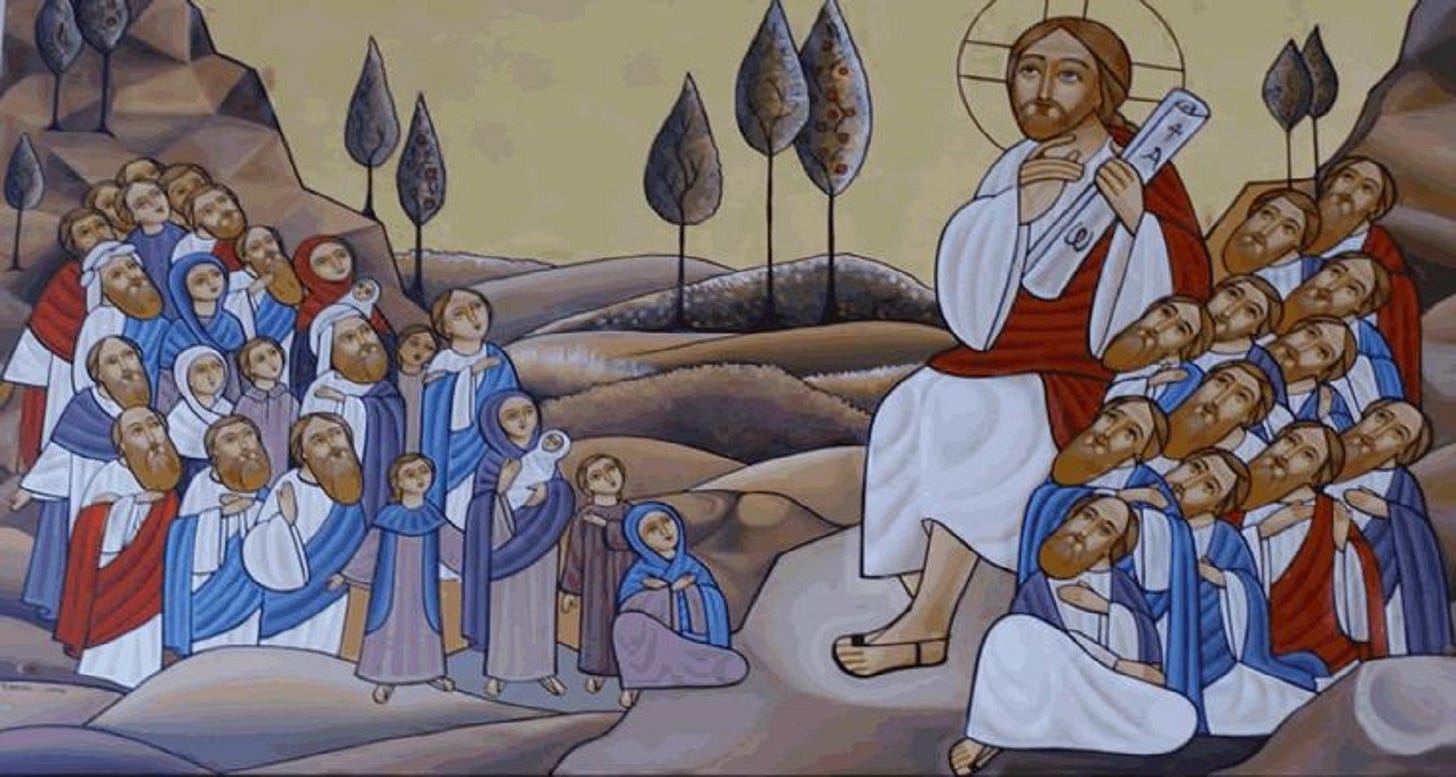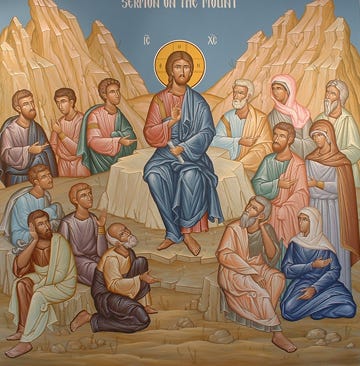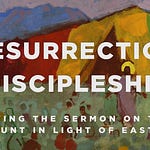At the start of the Sermon on the Mount, Jesus communicates his identity and the purpose of his ministry. Jesus’s identity is the Son of God, the second person of the Holy Trinity, fully divine and fully human. The Savior of Creation. His mission cannot be separated from His identity: to deliver all of Creation from captivity to Sin and Death, reconcile us to one another and God, and reveal the fullness of the Kingdom of Heaven.
“Blessed are the poor in spirit.”
“Blessed are those who mourn.”
“Blessed are the meek.”
“Blessed are those who hunger and thirst for righteousness.”
“Blessed are the merciful.”
“Blessed are the pure in heart.”
“Blessed are the peacemakers.”
“Blessed are those who are persecuted for righteousness’ sake.”
“Blessed are you when people revile you and persecute you and utter all kinds of evil against you.”
From the side of a mountain, Jesus casts an eschatological vision for the Kingdom of Heaven, a vision for what will come when the Kingdom of Heaven is fully revealed across Creation – a vision based upon the blessings of God, independent from how the world deals out blessings. No “ifs” or “thens” are attached to the beginning of Jesus’s sermon. Jesus does not say, “If you are poor in spirit, you will be blessed. If you mourn, you will be blessed”.” He never says, “If you are a peacemaker, then you will be blessed.”
We are blessed in the Kingdom of Heaven because of who God is. Blessed, not because we have our act together, prayed the correct prayers, or checked the boxes others tell us (we tell ourselves) must be checked so that God might take notice.

All Saints Day and All Saints Sunday are celebrated in the church to serve as a moment to pause and remember the saints of the Church who have gone before us. The feast day began as a way for the church to remember those killed during times of persecution and continues today so that we can remember those dearly departed from this life who have been and continue to be a means of God’s grace.
The saints of the Church helped form the Church into who we are today. They led Sunday school conversations (Lori Shipley), taught us about God’s love by teaching us to sing “Jesus Loves Me” (Carol Frank), and coached pastors to slow down the Great Thanksgiving and Lord’s Prayer so that the words of grace could wash over the congregation. The saints are those who now rest in Christ, awaiting the resurrection and the fulfillment of the Kingdom of Heaven.
The Beatitudes remind us what this fulfillment will look like comfort, mercy, the presence of God, and blessing. Jesus’s list of blessings is first and foremost about God and secondarily about us.
The Beatitudes sound foolish to us.
Why on earth would anyone want to suffer to receive a blessing?
Poor in spirit? No thanks.
Mourning? I’d like to pass.
Hunger? I’ll see you all in the Fellowship Hall after the service for a slice of cake.
The world tells us the poor in spirit, those who mourn, the meek, those who hunger and thirst for righteousness, the merciful, the pure in heart, the peacemakers, and the persecuted are not blessed. Each is battling one or many things that disqualify them from the world’s blessing. We do not think behaving as Jesus did or would have us behave is sensible. We question if God really is the way Jesus describes God.
Yesterday I officiated a wedding. In the lead-up to the wedding, as I helped the couple prepare the worship service, I successfully persuaded them not to choose 1 Corinthians 13. You know it, right? Love is patient, kind, not boastful or envious. I told them that if they expected the love in their marriage to be patient, kind, and all of the other things Paul lists, they were setting themselves up for disappointment and failure. And because I have a perfect record when it comes to weddings and marriages, failure is not an option.

I told Elizabeth and Nathaniel I thought 1 Corinthians 13 was more appropriate for a funeral or a day like All Saints Sunday because the love Paul describes is God’s love, revealed to us in Christ Jesus.
Just as the love Paul describes to the saints of Corinth is the first and foremost the love God holds for us, the Beatitudes describe how God is forming us, the Church today, how God formed the saints of the past, and how God will form the saints that are yet to come.
In the beginning of the Sermon on the Mount, Jesus calls his disciples – of yesterday, today, and tomorrow – to hear Him and walk in the way of God’s will for our lives.
Jesus is the personification of the Beatitudes.
The rich who became poor.
He mourned over our Sin and rejection.
He is the one who truly thirsts and hungers for righteousness so that we would be reconciled with God.
He is the only person who is merciful to his enemies, the peacemaker willing to lay down his life for the sake of all Creation.
Jesus is not offering his disciples moralistic if/then propositions. Jesus does the Beatitudes to the point of his death. And through your baptism and willingness to follow Christ, the Beatitudes become yours, and they become a description of the great cloud of saints so that no matter the ordeal, you and the saints are blessed.


















Share this post